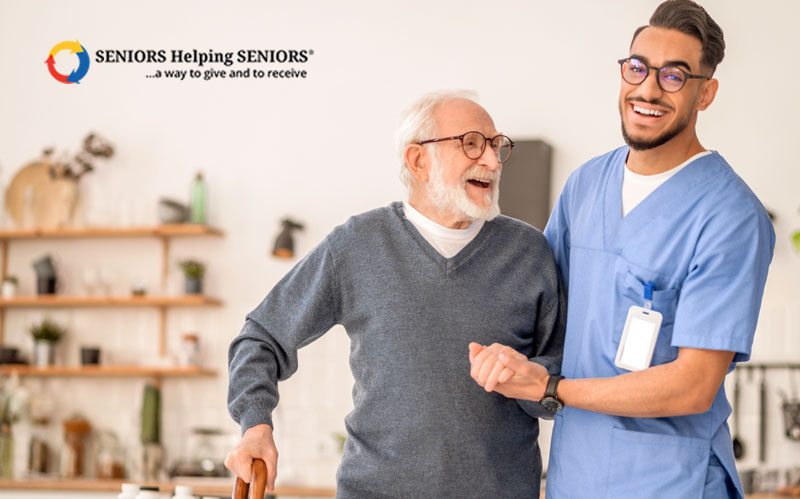What Makes a Great In-Home Caregiver? Traits to Look For When Hiring

More than just help around the house, great care begins with great people.
Why the Right Caregiver Makes All the Difference
Inviting someone into your home or your loved one’s home to provide care is a deeply personal decision. It’s not just about experience or checking off a list of services. It’s about trust, comfort, and the relationship that grows over time.
Whether you’re hiring independently or working through an agency, it’s critical to know what to look for in an in-home caregiver. The right match can create not only peace of mind, but a genuine connection that enriches daily life. The wrong fit? It can leave everyone feeling like a stranger just walked through the door.
Let’s explore the qualities that define a great caregiver—and why the Seniors Helping Seniors® model prioritizes continuity and compatibility over quick fixes.
1. Reliability and Consistency
A great caregiver shows up on time, every time and not just physically. They’re present, dependable, and follow through on responsibilities. This creates a sense of stability, especially for seniors managing cognitive decline or anxiety.
Why It Matters:
Rotating caregivers or no-shows can be incredibly stressful. Seniors may feel disoriented, unsafe, or unwilling to trust new faces. At Seniors Helping Seniors®, we assign regular caregivers so clients build familiarity and comfort over time not a revolving door of strangers.
2. Empathy and Emotional Intelligence
Empathy isn’t something you can train in a classroom. The best caregivers listen with their heart, notice changes in mood, and respond with patience and compassion.
Why It Matters:
Many seniors are facing loneliness, grief, or frustration with their changing bodies. A caregiver who connects emotionally can help rebuild confidence and trust in others and in themselves.
3. Communication Skills
A caregiver should be able to communicate clearly and respectfully with both the client and their family. That includes understanding boundaries, sharing updates, and knowing when to alert family or care coordinators to potential issues.
Why It Matters:
t Seniors Helping Seniors®, our team uses the ClearCare Family Room portal so loved ones can view care schedules, read notes, and communicate with us adding transparency and peace of mind.
4. Patience and Flexibility
Every day brings new challenges. Seniors may need more time to complete tasks, may repeat stories, or resist certain types of help. A great caregiver knows how to adapt without frustration.
Why It Matters:
The relationship between a caregiver and client is built on patience. It allows for trust to develop naturally and for care to feel like a partnership, not a procedure.
5. Shared Interests and Personality Compatibility
While skill and professionalism matter, so does chemistry. A caregiver who shares similar values, humor, or background can turn a standard care visit into a warm, engaging friendship.
Why It Matters:
This is at the heart of the Seniors Helping Seniors® approach. Because our caregivers are often seniors themselves, they may have many shared life experiences with their clients, which leads to natural, respectful relationships.
6. Proper Training and Experience
Even non-medical care requires knowledge and attention to detail. A great caregiver should understand safe mobility practices, hygiene protocols, and how to handle challenges like memory loss or resistance to care.
Why It Matters:
We ensure every caregiver at Seniors Helping Seniors® is trained, background-checked, and supported by an experienced team. But we don’t stop there we focus on ongoing support and matching each caregiver to the right client, not just anyone who’s available.
External Resource:
National Institute on Aging – Tips for Hiring a Caregiver
7. The Power of a Consistent Caregiver Relationship
What really sets great home care apart is the consistency of the caregiver. When the same trusted person visits regularly, they notice changes in behavior, catch early warning signs, and build a relationship that improves emotional well-being.
Compare this to rotating caregivers with a different face every week. Seniors may feel hesitant to open up, or even forget who’s supposed to help them today. Instead of comfort, it feels like an intrusion.
At Seniors Helping Seniors®, we carefully assign one or two consistent caregivers per client to develop long-term rapport and a sense of safety and belonging.
Key Takeaways For Senior Care Giving
- The best in-home caregivers are reliable, empathetic, communicative, and patient with real experience and a compatible personality.
- Rotating caregivers can feel unsettling. A consistent caregiver builds trust and comfort over time.
- Seniors Helping Seniors® matches each client with a mature, compassionate caregiver for consistent, relationship-based care.
- The result is more than assistance, it’s a bond that enhances quality of life.
Suggested Resources
- NIA: Hiring a Caregiver
- AARP: Questions to Ask Before Hiring In-Home Help
- Family Caregiver Alliance – Selecting a Home Care Provider






